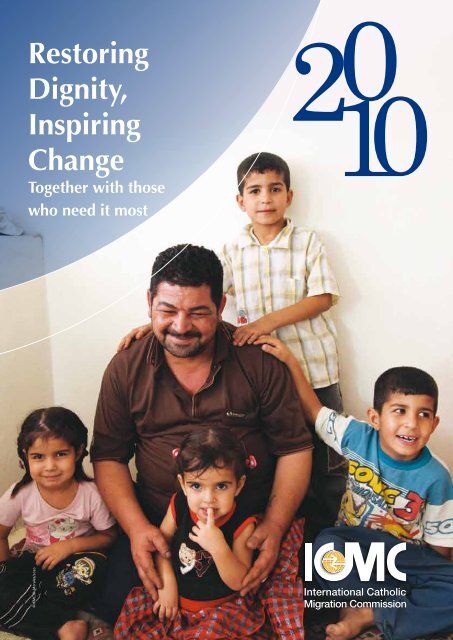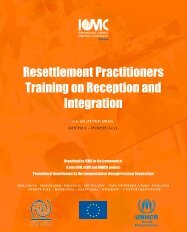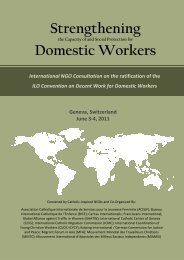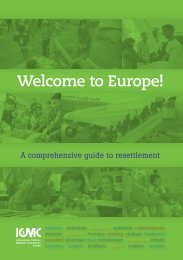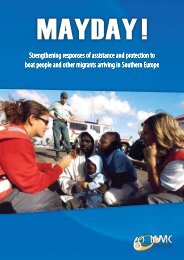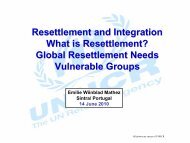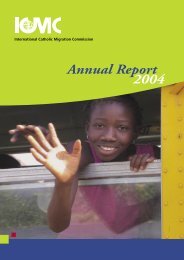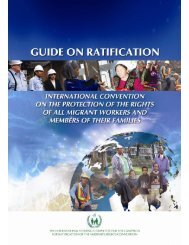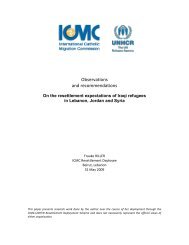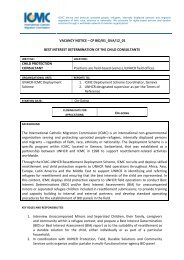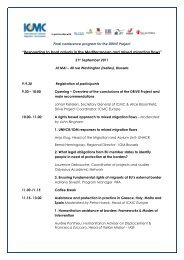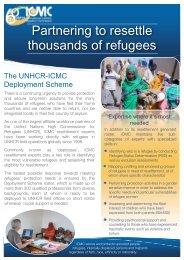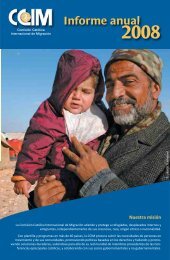Annual Report 2010 - ICMC
Annual Report 2010 - ICMC
Annual Report 2010 - ICMC
You also want an ePaper? Increase the reach of your titles
YUMPU automatically turns print PDFs into web optimized ePapers that Google loves.
Restoring<br />
Dignity,<br />
Inspiring<br />
Change<br />
Together with those<br />
who need it most<br />
©<strong>ICMC</strong>/A. Morales/<strong>2010</strong><br />
International Catholic<br />
Migration Commission
Embracing responsibility within human mobility<br />
As <strong>ICMC</strong> prepares to celebrate sixty years of dedicated service to<br />
migrants and refugees, it is sobering to think that so many of the<br />
challenges first faced while accompanying refugees of the Second<br />
World War have not only persisted through the years, but have, in<br />
many ways, become yet more complex.<br />
Today, as it was sixty years ago, respect for the dignity of all human<br />
beings remains paramount. And yet, with the global population<br />
expected to reach 9 billion within two generations, the distribution<br />
of the world’s resources and the realities of human mobility will<br />
continue to bear heavily on one another. Now more than ever, we<br />
must recall that humankind alone is responsible for the structures<br />
and order in which we live, and that a healthy mix of orderly systems<br />
and procedures—and recognition of moral responsibilities—will<br />
be essential if we wish to develop the structures needed to ensure<br />
equity and harmony for our common, global future.<br />
Working with and on behalf of displaced people from all walks<br />
of life, this report offers a birds-eye view of <strong>ICMC</strong>’s activities<br />
over the course of <strong>2010</strong>: a snapshot of the way in which<br />
suffering and commitment converge into hope and<br />
fraternity; of <strong>ICMC</strong>’s deep concern for the wellbeing<br />
of those who have chosen or been forced to leave<br />
their homes; of unity and solidarity and—above<br />
all—a snapshot of the individuals and families we<br />
support. It is their voice and continued call for a<br />
different, more dignified future that <strong>ICMC</strong> strives<br />
to carry.<br />
Through this work, and grounded in the Social Doctrine of the<br />
Church, we are reminded that the array of dynamic tensions and<br />
perspectives with which we are so often confronted need not be in<br />
contradiction with one another. It is in fact not a question of human<br />
dignity vs. societal defence, collective societal interests vs. the<br />
individual desire for a better life, or national sovereignty vs. global<br />
governance; it is a matter of finding the balance between them and<br />
advocating for the choices that will keep each person’s dignity at<br />
the heart of the drive to move society forward. This is the mission<br />
to which <strong>ICMC</strong> has been faithful for now on sixty years.<br />
As we look to 2011 with special appreciation of the ongoing<br />
support and engagement of our members, partners, donors and<br />
staff, we remain ever committed to accompanying those whose<br />
vulnerabilities have become exacerbated by migration—be it forced<br />
or by choice— and look forward to continuing to extend support and<br />
protection to so many who are yet awaiting the chance to contribute<br />
to the future.<br />
John KLINK<br />
President<br />
Johan KETELERS<br />
Secretary General<br />
www.icmc.net<br />
The International<br />
Catholic Migration<br />
Commission<br />
serves and protects<br />
uprooted people: refugees,<br />
internally displaced persons<br />
and migrants, regardless<br />
of faith, race, ethnicity or<br />
nationality.<br />
With staff and programmes in over<br />
40 countries, <strong>ICMC</strong> responds to the<br />
challenges of people on the move<br />
and their communities, implementing<br />
and advocating for rights-based policies<br />
and durable solutions with its worldwide<br />
membership of Catholic Bishops’<br />
Conferences, and alongside governmental<br />
and non-governmental partners.<br />
2 www.icmc.net
“The complexity and gravity of the present economic<br />
situation rightly causes us concern, but we must<br />
adopt a realistic attitude as we take up with<br />
confidence and hope the new responsibilities to which<br />
we are called by the prospect of a world<br />
in need of profound cultural renewal,<br />
a world that needs to rediscover fundamental<br />
values on which to build a better future.”<br />
Caritas in Veritate 21,<br />
Human development in our time<br />
<strong>ICMC</strong> programs in the Middle East<br />
provide hundreds of people, including<br />
this man, with blankets, heaters<br />
and stoves that are distributed<br />
at the Caritas office in Amman.<br />
©<strong>ICMC</strong>/A. Morales/<strong>2010</strong><br />
www.icmc.net 3
Restoring dignity, inspiring change<br />
Together with refugees in need of resettlement<br />
For some refugees and their families who have fled their home<br />
in fear of persecution, returning safely to their home country or<br />
integrating within the country where they first found refuge may<br />
never be possible. For these people, resettlement offers an alternative,<br />
durable solution.<br />
Resettlement Support Center<br />
For three decades, the International Catholic Migration Commission<br />
(<strong>ICMC</strong>) has partnered with the U.S. State Department to conduct<br />
resettlement processing and cultural orientation for hundreds<br />
of thousands of refugees seeking to be resettled in the United<br />
States. As <strong>ICMC</strong> resettlement efforts continue to focus on ensuring<br />
protection for those who are most vulnerable, this important<br />
partnership with the U.S. Department of State, Bureau of<br />
Population, Refugees and Migration (BPRM) was renewed in <strong>2010</strong><br />
for the coming three years.<br />
<strong>ICMC</strong> directly assists refugees in need of resettlement by preparing<br />
their cases for presentation to U.S. Citizenship and Immigration<br />
Services (USCIS), and facilitating pre-departure processes, such as<br />
cultural orientation sessions and medical examinations. Since the<br />
early 1980s, more than 25,000 refugees have been resettled by the<br />
<strong>ICMC</strong> Resettlement Support Center in Istanbul, Turkey (formerly<br />
known as the Overseas Processing Entity). An <strong>ICMC</strong> sub-office in<br />
Lebanon further provides support, while mobile teams work with<br />
individuals and their families in Kuwait, the United Arab Emirates<br />
(UAE) and Yemen. Of particular interest in <strong>2010</strong>, <strong>ICMC</strong> undertook<br />
“The most rewarding part of being<br />
a deployee is the opportunity to<br />
interview refugees who have lost<br />
everything, including the hope of a<br />
better life, and be able to make a real<br />
difference in their lives. Resettlement<br />
provides a lasting solution for<br />
refugees, and I enjoy being part of<br />
the global strategy to achieve this.”<br />
Bahia HAMCHA, <strong>ICMC</strong> deployee deployed<br />
to Tanzania (2009), Sudan (<strong>2010</strong>),<br />
Kenya (<strong>2010</strong>), Egypt (2011)<br />
Iraqi children are better prepared<br />
to cope with their transition to<br />
the United States after completing<br />
a 3-day Cultural Orientation session<br />
at the Resettlement Support Center in<br />
Istanbul, Turkey.<br />
4 www.icmc.net<br />
<strong>ICMC</strong>/<strong>2010</strong>
a joint mission with the U.S. State Department BPRM to Kuwait<br />
and the UAE to examine the situation of refugees living there, meet<br />
with key partners, and explore an array of resettlement options.<br />
Since 2007, <strong>ICMC</strong>’s resettlement programme has experienced<br />
steady growth, largely in response to Iraqis who have fled to<br />
Lebanon and Turkey. Of the more than 18,000 Iraqi refugees<br />
resettled to the U.S. in <strong>2010</strong>, more than 5,000 were supported<br />
by <strong>ICMC</strong> in Turkey. In addition to Iraqis, <strong>ICMC</strong> works with women,<br />
children and men of more than 25 different nationalities, including<br />
Afghans, Iranians and Somalis.<br />
In <strong>2010</strong>, sixteen percent of all refugees who departed to the U.S.<br />
with the help of <strong>ICMC</strong> began rebuilding their lives in El Cajon,<br />
California. In recognition of the impact that this work has had on<br />
these individuals and the local community, U.S. Congressman,<br />
Duncan Hunter, extended an invitation <strong>ICMC</strong> to visit the district,<br />
which is also home to a large Iraqi Chaldean population. <strong>ICMC</strong> met<br />
with newly resettled refugees and relatives of those still remaining<br />
in Turkey and Lebanon, providing perspective on the domestic and<br />
overseas resettlement continuum, and allowing <strong>ICMC</strong> to hone key<br />
messages for strengthening cultural orientation programmes.<br />
<strong>ICMC</strong>-UNHCR Resettlement Deployment Scheme<br />
<strong>ICMC</strong> resettlement experts have been working directly with<br />
refugees in the United Nations High Commissioner for Refugees<br />
(UNHCR) field operations globally since 1998 to meet the continuing<br />
urgency to secure protection and lasting solutions for those refugees<br />
most in need. Commonly known as ‘deployees’, <strong>ICMC</strong> resettlement<br />
experts play a key role in identifying individuals who are especially<br />
vulnerable and assessing their eligibility for resettlement. In <strong>2010</strong>,<br />
<strong>ICMC</strong> deployment staff assessed over 85,000 refugees globally. Of<br />
these, nearly 56,000 were referred for resettlement consideration,<br />
significantly contributing to the total number of people whose<br />
cases were submitted to resettlement countries by UNHCR over<br />
the course of the year.<br />
While the majority of <strong>ICMC</strong> deployees are engaged in<br />
casework, deployees are also regularly concerned with<br />
victims of violence and torture, ‘women at risk’ and other<br />
highly vulnerable refugees. In addition, <strong>ICMC</strong> resettlement<br />
experts conduct best interest determinations for<br />
children (BIDs), set-up BID operating procedures,<br />
serve on BID panels and provide training on BID<br />
and sexual and gender-based violence (SGBV)<br />
at UNHCR operations in many countries,<br />
including Cameroon, Chad, Kenya and<br />
Sudan.<br />
More than 300 resettlement experts from diverse backgrounds<br />
are prepared to be deployed to UNHCR field offices throughout<br />
Africa, Asia, Europe, Latin America and the Middle East on short<br />
notice and whenever crucial support is needed. In preparation for<br />
their deployment to a UNHCR field office, the Deployment Scheme<br />
provides a training workshop in Geneva on core refugee protection<br />
and resettlement principles.<br />
Building capacity in resettlement<br />
Despite concerted efforts to identify, refer and prepare individuals<br />
and their families for resettlement in the absence of other<br />
alternatives, less than 1% of eligible refugees worldwide are<br />
given the opportunity to resettle to a new country. In <strong>2010</strong>, <strong>ICMC</strong><br />
actively advocated for higher numbers of resettlement places,<br />
while promoting the strategic use of resettlement to improve the<br />
living conditions of refugees in the country of asylum and to unlock<br />
protracted refugee situations.<br />
In particular, <strong>ICMC</strong> joined the International Organization for<br />
Migration (IOM) and UNHCR to promote resettlement and<br />
cooperation, and to enhance the capacity of resettlement providers<br />
in 10 EU countries, namely: Belgium, France, Hungary, Netherlands,<br />
Portugal, Poland, Romania, Slovakia, Sweden and the United<br />
Kingdom. Supported by the European Refugee Fund (ERF), this<br />
work centred around concerted efforts to promote cooperation<br />
at local levels, and bring together municipalities and NGOs from<br />
across Europe to exchange on effective practices on the reception<br />
and integration of resettled refugees.<br />
Refugees sign the declaration page<br />
of their Resettlement Registration<br />
Form after being interviewed by an<br />
<strong>ICMC</strong> deployee in the Nakivale refugee<br />
settlement in Uganda.<br />
©<strong>ICMC</strong>/K. Urban/<strong>2010</strong><br />
www.icmc.net 5
Restoring dignity, inspiring change<br />
Together with displaced Iraqis and their families<br />
The situation in Iraq remains too unsafe to support any large-scale<br />
return of Iraqis displaced either inside or across Iraq’s borders.<br />
Many Iraqis in protracted exile face both an uncertain future and<br />
agonizing choices on how to earn a living or allocate their diminishing<br />
resources to cover the cost of their immediate needs,<br />
including housing and medical care.<br />
<strong>ICMC</strong> continues to engage directly with displaced Iraqi families to<br />
address their most critical humanitarian needs, especially those of<br />
single-headed households, large families with insufficient economic<br />
resources, elderly persons and individuals with disabilities or<br />
psychological trauma. As part of these efforts, Iraqi volunteers<br />
trained by <strong>ICMC</strong> are actively involved in assessing assistance needs<br />
within their own communities. Supported by funding from the<br />
European Commission Humanitarian Aid Office (ECHO) and BRPM,<br />
this community-based, participatory approach draws its strength<br />
from the fact that Iraqis themselves help provide referrals to other<br />
programs and disseminate health awareness information.<br />
In addition to Iraqis, assistance has also been made available to<br />
others in need in communities hosting Iraqi refugees in Jordan<br />
and Syria, as well as to other recognized refugees from countries<br />
including Afghanistan, Eritrea, Ethiopia, Somalia, Sri Lanka, and<br />
Sudan. In cooperation with <strong>ICMC</strong>’s local partners Caritas Jordan<br />
and Terre des Hommes Syria, over 12,000 Iraqis and 4,800 host<br />
country nationals received critical non-food items and needed<br />
health care support over the course of <strong>2010</strong>. Forty-seven Iraqis in<br />
need of heart and cancer surgeries and other critical treatments also<br />
received life-saving operations, thanks to funding from BPRM, and<br />
close collaboration with UNHCR’s Exceptional Care Committee.<br />
Additionally, <strong>ICMC</strong> received in <strong>2010</strong> a new grant from BPRM<br />
to begin providing assistance to refugees in Turkey. Over the<br />
course of the coming year, educational and psychosocial<br />
assistance will be made available to Iraqi and non-Iraqi<br />
refugees and asylum seekers, including language classes to<br />
both better their day-to-day life while in Turkey, and prepare<br />
them for life in their future country of resettlement.<br />
Over and above humanitarian assistance, <strong>ICMC</strong> continues<br />
to bring the immediate needs, concerns and resilience of<br />
uprooted Iraqi families to the attention of national and<br />
international policy-makers in Brussels, Geneva and<br />
Washington. Advocating for a comprehensive<br />
approach towards achieving durable solutions<br />
for Iraqi refugees, <strong>ICMC</strong> and the International<br />
Rescue Committee (IRC) launched a joint<br />
study entitled, 10,000 Refugees from<br />
Iraq: A report on joint resettlement in<br />
the European Union at the European<br />
Parliament in May <strong>2010</strong>.<br />
The report evaluates the follow-up<br />
on the EU Council commitment<br />
made in November 20 0 8 to<br />
welcome 10,000 Iraqi refugees<br />
into European communities<br />
o n a p e r m a n e n t b a s i s a n d<br />
p r ov i d e s r e co m m e n da tions<br />
for the road ahead under future<br />
EU resettlement initiatives that<br />
combines humanitarian assistance,<br />
resettlement and other policies to ensure<br />
the protection of Iraqi refugees.<br />
<strong>ICMC</strong>/A.Morales/<strong>2010</strong><br />
“It is our hope that resettlement<br />
will become an integral part of EU<br />
joint strategies for countries<br />
and regions affected by conflict<br />
and displacement.”<br />
10,000 Refugees from Iraq,<br />
A <strong>Report</strong> on Joint Resettlement<br />
in the European Union<br />
A refugee woman supported by <strong>ICMC</strong><br />
assistance programs recalls fond<br />
memories of her life in Iraq before<br />
she and her brother were forced to flee<br />
the continuing violence. She has since<br />
been resettled to Canada.<br />
6 www.icmc.net
More than 17,000<br />
people are estimated to have died along European sea and land borders<br />
since 1988. Thousands more have been reported missing.<br />
©UNHCR/A.Rodríguez<br />
Restoring dignity, inspiring change<br />
Together with “boat people” and other victims<br />
of violence and trauma<br />
Many migrants, refugees and displaced people find themselves<br />
exposed to mortal risks before, during and after leaving their<br />
countries of origin. The effects of conflict and war, torture,<br />
imprisonment, abuse, life-threatening migration journeys, the<br />
loss of loved ones, long stays in refugee camps and socio-economic<br />
hardship often cause trauma and enormous suffering<br />
that call for distinct protection, assistance and preventative<br />
efforts—especially for women and children.<br />
Mixed migration<br />
Since first established nearly sixty years ago, <strong>ICMC</strong> has been a<br />
staunch advocate of humane and efficient responses to those<br />
arriving by boats especially, most notably during the Indochina crisis<br />
in the late 1940s. In <strong>2010</strong>, and at the request of <strong>ICMC</strong> members,<br />
<strong>ICMC</strong> has taken a leading role in calling for the urgent development<br />
of international standards to ensure effective first aid, recovery<br />
and referral to services for individuals involved in mixed migration<br />
situations—especially “boat people.” In particular, <strong>ICMC</strong> has worked<br />
to improve responses of appropriate protection for victims of<br />
human trafficking, or gender-based violence, vulnerable women<br />
and children, refugees and asylum seekers.<br />
Continued on page 8<br />
“The drinking water and food<br />
ran out… people died every day<br />
from dehydration, sunstroke,<br />
hunger or simply because they lost<br />
their minds and could not<br />
take it any longer.”<br />
A young Ethiopian asylum seeker,<br />
on his failed attempt to reach Europe by boat<br />
www.icmc.net 7
With funding from the EU, and in partnership with eight NGO<br />
partners in the Mediterranean, <strong>ICMC</strong> launched the “DRIVE Referral”<br />
project (Differentiation for Refugee Identification and Vulnerability<br />
Evaluation). The project brings together local NGOs, IOM, UNHCR,<br />
the Red Cross network, and other service providers in Greece, Italy,<br />
Malta and Spain for a close look at current practices and gaps in<br />
responding to the needs and multiple rights of people arriving by<br />
boat in those four countries. In addition to promoting the capacity<br />
and cooperation of actors on-the-ground and across the region,<br />
over four hundred surveys were carried out with ‘boat people’ and<br />
other stakeholders. Analyses and exchanges will allow <strong>ICMC</strong> and<br />
its partners to identify good practice gaps and recommendations<br />
that insist upon more humane responses to all individuals in mixed<br />
migration situations.<br />
Gender-based violence (GBV)<br />
The suffering experienced by individuals and their families who<br />
have fallen victim to violence and trauma in displacement is not<br />
only seen in mixed migration situations. With new funding from<br />
BPRM, <strong>ICMC</strong> has continued to work with Burmese communities in<br />
Kuala Lumpur, Malaysia to prevent and combat GBV amongst this<br />
urban, at-risk refugee population.<br />
Among other key activities, <strong>ICMC</strong> established a Refugee Women’s<br />
Protection Corps that spearheads community-based awareness<br />
raising efforts and facilitates the disclosure of GBV incidents.<br />
Together with the Sisters of the Good Shepherd, <strong>ICMC</strong> has further<br />
worked to leverage existing resources in support of medical and<br />
psychological care, shelter for GBV survivors, and conducts an<br />
informative “Keeping me safe” child abuse prevention training for<br />
refugee children, teachers and parents.<br />
With a view to strengthening GBV prevention and response efforts<br />
on a global level, <strong>ICMC</strong> was also specifically invited to contribute to<br />
the development of UNHCR’s GBV Strategic Plan for 2011-2016,<br />
with a focus on refugees living in both urban and camp settings,<br />
GBV prevention measures and victim assistance. Over the coming<br />
period, <strong>ICMC</strong> will work closely with UNHCR to put the strategic<br />
plan into action and create community-based solutions that offer<br />
tangible, long-term impact.<br />
“Going forward from this training,<br />
I will help and support those who are<br />
suffering from sexual and genderbased<br />
violence as much as I can in my<br />
community. They are my neighbors.<br />
With the help of the community<br />
leaders, I am sure that I can do<br />
more and more.”<br />
Community Leader, in pledge made at<br />
the conclusion of an <strong>ICMC</strong> training on GBV<br />
A Burmese woman from the Refugee Women’s<br />
Protection Corps leads a training session with<br />
Burmese refugees in Kuala Lumpur on preventing and<br />
combating gender-based violence.<br />
©<strong>ICMC</strong>/J.Loo<br />
8 www.icmc.net
Restoring dignity, inspiring change<br />
Together in the fight against<br />
human trafficking<br />
Enticed by false promises of well-paying jobs, separated from their<br />
families, and tricked, exploited and abused in innumerable ways,<br />
an estimated 2.4 million men, women and children around the<br />
world each year suffer terrible violations of their human dignity at<br />
the hands of traffickers.<br />
Human trafficking, its relation to statelessness, and the critical need<br />
for anti-trafficking initiatives focused on safe, dignified migration<br />
as a means of prevention continue to represent an important focus<br />
of <strong>ICMC</strong> and its members. In <strong>2010</strong>, and as part of this commitment<br />
to strengthen victim-centered approaches within national,<br />
regional and international frameworks, and raise awareness of the<br />
prevalence of trafficking, <strong>ICMC</strong> successfully concluded a two-anda-half<br />
year counter trafficking project funded by the EU Thematic<br />
Programme for Migration and Asylum, which served to combat<br />
cross- border trafficking and debt bondage of Indonesian women<br />
and girls in South East Asia.<br />
Involving a combination of activities in prevention, protection,<br />
prosecution and the development of partnerships, nearly 20,000<br />
vulnerable women and girls were able to take advantage of <strong>ICMC</strong><br />
anti-trafficking prevention activities, while over 200 trafficking<br />
survivors received support services. Strengthening the capacity of<br />
local communities and government authorities to combat human<br />
trafficking, <strong>ICMC</strong> provided targeted training to more than 2,000<br />
government officials of central and local levels, journalists and other<br />
media, legislators, law enforcement agents and NGO practitioners<br />
from Indonesia and Malaysia in <strong>2010</strong>. Along with partner NGOs,<br />
<strong>ICMC</strong> assisted local governments in 12 districts and provinces<br />
in Indonesia in drawing up decrees for the creation of a Counter<br />
Trafficking Task Force (CTTF), and local plans of action aimed at<br />
fortifying cooperative efforts to combat trafficking.<br />
As part of this project, <strong>ICMC</strong> produced a widely disseminated video<br />
and training manual, entitled “Bondaged Souls”, which reveals the<br />
suffering of trafficking victims in Malaysia, both for prostitution<br />
and labour, and provides a practical resource for expanding<br />
understanding of cross-border human trafficking, particularly in<br />
the Asia-Pacific Region.<br />
<strong>ICMC</strong>’s active involvement in fight against trafficking in South East<br />
Asia has been further reinforced by the January <strong>2010</strong> decision of<br />
the Office to Monitor and Combat Trafficking in Persons (G-TIP) of<br />
the U.S. Department of State to extend the cross-border counter<br />
trafficking project in Indonesia and Malaysia through 2011, with<br />
a specific focus on curbing the trafficking and debt bondage<br />
of Indonesian women and girls who are brought to Sabah for<br />
commercial sexual exploitation.<br />
In the Middle East, <strong>ICMC</strong> continues to place its primary focus on<br />
supporting female survivors of trafficking and sexual exploitation—<br />
including especially migrant domestic workers—through its work<br />
with the Caritas Lebanon Migrant Centre (CLMC). In addition to<br />
offering 24 hour, 7 day-a-week help hotlines, the CLMC Safe House<br />
Shelter provided 164 trafficking survivors with comprehensive<br />
protection and legal assistance, repatriation support, medical and<br />
psychological care and vocational training in <strong>2010</strong>.<br />
©<strong>ICMC</strong>/J.Bloom<br />
Women from Samsui,<br />
China fled by boat to<br />
Singapore in the 1930s, where<br />
they played an important part<br />
in building up the country.<br />
These dolls are made by<br />
migrant women now living<br />
in shelters run by the Good<br />
Shepherd Sisters as a tribute<br />
to the hard working Samsui<br />
migrants who came<br />
before them.<br />
20,000<br />
vulnerable women and girls benefitted<br />
from <strong>ICMC</strong> anti-trafficking prevention<br />
activities over the course of <strong>2010</strong>.<br />
www.icmc.net 9
Restoring dignity, inspiring change<br />
Together with migrant workers and their families<br />
Migrants are human beings, whose rights, dignity and security<br />
require specific and special protection. While it should not be the<br />
case, international migrants often fall into a state of effective ‘invisibility’,<br />
thanks to which they are particularly vulnerable to abuse<br />
and exploitation.<br />
Acting on the concerns of <strong>ICMC</strong> members worldwide, and as<br />
follow-up to distinct gaps and recommendations identified<br />
especially by those in Asia, <strong>ICMC</strong> has continued to promote the<br />
importance of dignified migration and rights, with a special focus on<br />
respect for family unity, protection for children, and the importance<br />
of a gender perspective in policies and practice regarding migrant<br />
workers and their families—especially for migrant domestic<br />
workers.<br />
As a member of the International Steering Committee, and<br />
President and Secretariat of the International NGO Platform<br />
on the Migrant Workers’ Convention, <strong>ICMC</strong> works closely with<br />
Church, NGO, and intergovernmental partners to promote the<br />
ratification and greater implementation of the UN Migrant Workers’<br />
Convention.<br />
Having also secured strong commitment to migrant workers and<br />
their families among Catholic-inspired NGOs at their international<br />
Forum in February <strong>2010</strong>, <strong>ICMC</strong> not only continued to collaborate<br />
with Church partners in preparing country-specific reports<br />
submitted to the UN Committee on Migrant Workers throughout<br />
the year, but also led a landmark effort to establish practical<br />
guidelines for the protection of migrant domestic workers, as a<br />
formal supplement to the UN Migrant Workers’ Convention.<br />
Adopted in November <strong>2010</strong> by the high-level UN body as the first<br />
ever “General Comment” to that Convention, the new jurisprudence<br />
made thirty-eight recommendations at national and multilateral<br />
levels, including the systemization of pre-departure “know your<br />
rights and obligations” preparation, regulating and monitoring<br />
recruitment processes and working conditions for migrant domestic<br />
workers, eliminating current sponsorship and other high-risk<br />
immigration policies, increasing access to justice and respecting<br />
family unity.<br />
<strong>ICMC</strong>’s efforts in this area are fueled by the work and experiences<br />
shared by <strong>ICMC</strong> members around the world, and feeds into concrete<br />
programming benefitting migrants and their families. In August<br />
<strong>2010</strong>, <strong>ICMC</strong> secured new funding from the Ford Foundation for<br />
the implementation of a project aimed at promoting access to<br />
remittances in rural areas of Indonesia through the formation of<br />
migrant workers’ organizations, micro finance institutions and self<br />
help groups. Over the course of the 15-month project, <strong>ICMC</strong> will<br />
work with its local partner, MICRA, to maximize the benefits of<br />
remittance money with a special focus on increasing the economic<br />
security of families in the eastern Indonesian provinces of South<br />
Sulawesi and West Nusa Tenggara and preventing debt bondage<br />
of migrants abroad.<br />
Migrant domestic workers in Singapore participate<br />
in a Japanese cooking workshop.<br />
©<strong>ICMC</strong>/J. Bloom/<strong>2010</strong><br />
10 www.icmc.net
<strong>ICMC</strong> addresses leaders of the 14 major intergovernmental<br />
organizations that together form the Global Migration Group.<br />
In October <strong>2010</strong>, the group released a historic joint statement<br />
on the rights and protection of irregular migrants.<br />
©OHCHR<br />
Restoring dignity, inspiring change<br />
Together towards the global<br />
governance of migration<br />
Migrants often risk everything for a better life for themselves and their families.<br />
In turn, their diversity of ideas, experiences and energies help to renew societies.<br />
But as a deeply emotional reality, migration also packs fears and perceptions<br />
that create anxieties for citizens of all backgrounds.<br />
As one of the few international civil society organizations dedicated<br />
specifically to migrants and refugees and engaged in on-theground<br />
programming as a funded partner of governments and<br />
inter-governmental entities, <strong>ICMC</strong> has pressed forward in <strong>2010</strong><br />
with its efforts to help frame and galvanize possibilities to improve<br />
international cooperation on migration.<br />
As part of this commitment, <strong>ICMC</strong> brought together 138 leaders<br />
in the field of migration for a series of organized but informal<br />
Conversations on the Global Governance of Migration. Making up<br />
nearly 50 percent of the participants, Ambassadors and senior-level<br />
government officials from countries of the North and South actively<br />
contributed to the initiative, which resulted in the publication of a<br />
provocative 47-page report entitled, ‘Working in Concert: Building<br />
common ground for the global governance of migration.”<br />
Compiled by <strong>ICMC</strong> with financial suppor t from the Swiss<br />
government, Working in Concert offered pointed recommendations<br />
for further discussion and action, including the need for states<br />
and other actors to go beyond<br />
immediate-term thinking on<br />
migration, address states’<br />
i n t e r e s t s i n m i g r a t i o n<br />
governance, elaborate what<br />
s u c h g o v e r n a n c e c o u l d<br />
really look like, and more<br />
purposefully engage central<br />
actors and agents of change<br />
in exploring and building<br />
common ground for better<br />
governance.<br />
“Too much of the<br />
conversation on migration<br />
today is at regional levels.<br />
‘Global governance’ may<br />
not be a welcome term,<br />
but ‘global’ is correct.”<br />
Working in Concert: Building<br />
common ground for the global<br />
governance of migration<br />
Bridging directly into the global arena, <strong>ICMC</strong> remained especially<br />
active in efforts to broaden network-building among actors<br />
involved in migration and development, including efforts to shift<br />
the Global Forum on Migration and Development (GFMD) towards<br />
greater on-the-ground impact and sustainability.<br />
www.icmc.net 11
Restoring dignity, inspiring change<br />
Together with communities facing emergencies<br />
In <strong>2010</strong>, the heaviest monsoon rains in Pakistan’s history left<br />
thousands of people dead and an estimated 18 million individuals<br />
directly affected. The floods destroyed entire villages, causing<br />
serious damage to infrastructure across the country, and left millions<br />
homeless and struggling to find food, safe drinking water and<br />
access to medical services.<br />
Within days of the disaster, <strong>ICMC</strong>’s emergency response team in<br />
Pakistan began addressing the needs of communities in some of<br />
the most severely hit areas in northern Pakistan. With funding<br />
from Caritas Germany, <strong>ICMC</strong> was able to provide primary health<br />
care consultations and free essential medicines through static and<br />
mobile medical clinics, which operated from Government Basic<br />
Health Units (BHUs) to serve the most vulnerable of the displaced—<br />
especially women and children from local communities and Afghan<br />
refugees.<br />
In the aftermath of the disaster, <strong>ICMC</strong> remains involved in<br />
coordinated response and assistance to rural communities<br />
affected by the floods and is providing front-line humanitarian<br />
relief and recovery interventions. With support from Caritas<br />
Germany, the German Federal Ministry of Economic Cooperation<br />
and Development (BMZ), Caritas Italy, United Nations Office for<br />
the Coordination of Humanitarian Affairs (UNOCHA)/Emergency<br />
Response Fund (ERF) and UNHCR, <strong>ICMC</strong> has been able to provide<br />
IDPs and Afghan refugees directly affected by the flooding with<br />
transitional and permanent shelters, while also ensuring that<br />
displaced families have access to adequate food, cooking utensils,<br />
clothing, bedding and personal hygiene items. For farmers, this<br />
also means rebuilding the infrastructure, resources and personal<br />
means needed to begin again with agricultural activities and take<br />
a step towards sustainable recovery.<br />
Given the frequency of natural disasters in Pakistan, <strong>ICMC</strong> is further<br />
providing Disaster Risk Reduction training to local communities to<br />
minimize the negative impact of these and other catastrophes by<br />
focusing on local emergency response and preparedness, safety<br />
awareness, disaster prevention and health and nutrition.<br />
<strong>ICMC</strong> interventions in the country maintain an explicit emphasis<br />
on providing assistance to refugees and internally displaced people<br />
and on establishing community-based solutions to aid extremely<br />
vulnerable individuals (EVIs). Simultaneously, <strong>ICMC</strong> conducted<br />
field assessments with local NGOs in Punjab province in order to<br />
effectively expand protection efforts and support to vulnerable<br />
households by working jointly to rebuild homes, livelihoods and<br />
key infrastructure.<br />
In Northern Pakistan, <strong>ICMC</strong> also continues to work with local NGOs,<br />
communities and authorities to sustainably improve the day-today<br />
lives of EVIs, while increasing the capacity of communities to<br />
become actively involved in their own development and protect<br />
the rights and human dignity of community members who may<br />
be especially vulnerable. These initiatives aim to strengthen local<br />
community forums and promote access to essential services and<br />
protection, while providing opportunities for EVIs to develop their<br />
skills and participate in business training sessions.<br />
In the aftermath of the Pakistan<br />
floods, <strong>ICMC</strong> medical staff<br />
provided health care consultations<br />
for hundreds of people that were<br />
in need of immediate assistance.<br />
©Caritas Germany/O.Schmidt<br />
12 www.icmc.net
<strong>ICMC</strong> members worldwide work to support and accompany<br />
migrants and their families in every corner of the globe.<br />
Over 120 Church leaders renewed their commitment<br />
to collaborate on behalf of displaced people at the <strong>2010</strong><br />
<strong>ICMC</strong> Council meeting in Rome.<br />
Restoring dignity, inspiring change<br />
Together with Church networks<br />
<strong>ICMC</strong>/A. Ryan <strong>2010</strong><br />
Dedicated to improving coordination for the benefit of uprooted<br />
people, <strong>ICMC</strong> maintains a permanent working relationship with<br />
its members that supports the prevention of forced migration,<br />
and the protection and assistance of migrants and refugees.<br />
On the eve of the 60th anniversary of <strong>ICMC</strong>, over 120 Church<br />
leaders and participants with an in-depth knowledge of migration<br />
gathered in Rome for the 55th meeting of the <strong>ICMC</strong> Council in<br />
November <strong>2010</strong>. Priority issues raised included strengthening joint<br />
efforts to address human trafficking, enhancing the regional voice<br />
in international advocacy, promoting migrant safety and dignity<br />
within labour migration, facilitating resettlement and community<br />
integration and reducing xenophobia and racism. Throughout each<br />
of these areas, the centrality of the family and the human person<br />
was underscored as a fundamental focus and later integrated<br />
within the new <strong>ICMC</strong> Strategic Plan for the next four years.<br />
Heading into 2011, <strong>ICMC</strong> is preparing to broaden its partnerships<br />
with local Church structures with a view to strengthening<br />
prevention and protection capacities in the Asia-Pacific region.<br />
Specifically, <strong>ICMC</strong> will be teaming up with Sisters of the Good<br />
Shepherd in Malaysia and other counter-trafficking experts to<br />
better coordinate services along trafficking routes. These include<br />
prevention activities in countries of origin, victim services and<br />
shelter in receiving countries, and livelihood and integration<br />
activities for those rescued and repatriated.<br />
With the Symposium of Episcopal Conferences of Africa and<br />
Madagascar (SECAM), <strong>ICMC</strong> co-hosted an African Consultation<br />
on Migration, which brought together leaders representing<br />
22 national and regional Bishops’ Conferences of Africa for<br />
deliberation on new collaborative approaches to migration.<br />
These included a legal status for migrants in Africa, root causes<br />
of migration, the effects of “brain drain”, growing xenophobia<br />
and the disconnect between many migration policies and<br />
contemporary political, social and economic realities.<br />
www.icmc.net 13
Restoring dignity, inspiring change<br />
Together with our donors<br />
We wish to thank all donors for their continued collaboration and<br />
financial support towards <strong>ICMC</strong> programming that directly benefits<br />
migrants, asylum seekers, refugees and internally displaced people<br />
in need.<br />
<strong>ICMC</strong>: A solid investment<br />
<strong>2010</strong> revenue<br />
Administrative management support<br />
Other grants<br />
and<br />
contributions<br />
UN Institutions<br />
EU<br />
US<br />
Government<br />
grants<br />
Revenue 2009 <strong>2010</strong><br />
US Government grants 11.160.000 10.559.000<br />
UN Institutions 5.135.000 5.224.000<br />
European Union 1.816.000 1.771.000<br />
Other grants and contributions 1.274.000 1.125.000<br />
Administrative and management<br />
support<br />
2.712.000 3.196.000<br />
TOTAL REVENUE 22.097.000 21.875.000<br />
Expenditures 2009 <strong>2010</strong><br />
Programmes 19.385.000 18.679.000<br />
Administration 2.712.000 3.200.000<br />
TOTAL EXPENDITURES 22.369.000 21.879.000<br />
Good stewardship in action<br />
<strong>2010</strong> expenditures<br />
Programmes<br />
directly<br />
benefitting<br />
displaced<br />
people and their<br />
communities<br />
Growing in response to need<br />
<strong>ICMC</strong> program growth 2005 - <strong>2010</strong><br />
Income<br />
Expenditures<br />
(Independently audited by Deloitte S.A., as of 31 December <strong>2010</strong>.<br />
All figures in USD millions)<br />
Administration<br />
Special thanks to our major donors, including:<br />
• Belgian Bishops Conference<br />
• Canadian Catholic Organization for Development and Peace<br />
• Catholic Agency for Overseas Development (CAFOD)<br />
• Caritas Germany<br />
• Caritas Italy<br />
• European Commission<br />
• European Commission Humanitarian Aid Office (ECHO)<br />
• European Refugee Fund (ERF)<br />
• Ford Foundation<br />
• German Federal Ministry for Economic Cooperation<br />
and Development (BMZ)<br />
• International Rehabilitation Council for Torture Victims (IRCT)<br />
• Italian Bishops Conference<br />
• MacArthur Foundation<br />
• Misereor<br />
• Oak Foundation<br />
• Swiss Federal Department of Foreign Affairs<br />
• The United Nations Children’s Fund (UNICEF)<br />
• United Nations Educational , Scientific and Cultural Organization<br />
(UNESCO)<br />
• UN Population Fund (UNFPA)<br />
• UN Office for the Coordination of Humanitarian Affairs<br />
(UNOCHA/ERF)<br />
• United Nations High Commissioner for Refugees (UNHCR)<br />
• US Conference of Catholic Bishops (USCCB)<br />
• US Department of State, Bureau of Population, Refugees,<br />
Migration (BPRM)<br />
• US Department of State, Office to Monitor and Combat<br />
Trafficking in Persons (GTIP)<br />
14 www.icmc.net
Restoring dignity, inspiring change<br />
Together with <strong>ICMC</strong><br />
<strong>ICMC</strong> Governing Committee<br />
President<br />
Mr. John M. KLINK (USA)<br />
Treasurer<br />
H.E. George Cardinal PELL (Australia)<br />
Secretary<br />
H.E. Bishop Precioso CANTILLAS (Philippines)<br />
Members<br />
H.E. John Cardinal NJUE (Kenya)<br />
H.E. Oscar Andrés Cardinal RODRIGUEZ MARADIAGA (Honduras)<br />
H.E. Christoph Cardinal SCHÖNBORN (Austria)<br />
H.B. Patriarch GREGORIUS III (Syria)<br />
H.E. Archbishop Emilio BERLIE BELAUNZARAN (Mexico)<br />
Rev. Mgr. Dr. Francis NDAMIRA (Uganda)<br />
Rev. Fr. Neil KARUNARATNE (Sri Lanka)<br />
Ambassador Johnny YOUNG (USA)<br />
Observers<br />
H.E. Archbishop Silvano TOMASI, Permanent Representative of the<br />
Holy See to the UN and Other International Organizations in Geneva<br />
Rev. Mgr. Novatus RUGAMBWA, Pontifical Council for the Pastoral<br />
Care of Migrants and Itinerant People<br />
Mr. Bernard RYELANDT, President <strong>ICMC</strong> Europe<br />
Counselors<br />
H.E. Archbishop François GAYOT (Haiti) †<br />
Sister Maryanne LOUGHRY (Australia)<br />
Sister Janete FERREIRA (Ecuador)<br />
<strong>ICMC</strong> Liaison staff<br />
Ms. Jane BLOOM, Liaison Officer (Washington)<br />
Ms. Petra HUECK, Program Manager (Brussels)<br />
<strong>ICMC</strong> Programme staff<br />
Mr. Fatimana (Agus) AGUSTINANTO, Head of Office (INDONESIA)<br />
Ms. Linda BESHARATY, Coordinator,<br />
UNHCR-<strong>ICMC</strong> Deployment Scheme (SWITZERLAND)<br />
Mr. Noel DASS, National Programme Manager (MALAYSIA)<br />
Ms. Kate DORSCH, Programme Manager (LEBANON)<br />
Ms. Ayesha SHAUKAT, Country Director (PAKISTAN)<br />
Ms. Linda SAMARDZIC, Director,<br />
Resettlement Support Center (TURKEY)<br />
Mr. Zeljko (Jack) TONCIC, Regional Director (JORDAN)<br />
Ms. Tanja ZWACK GEORPAKOPOULOU, Liaison Manager (GREECE)<br />
<strong>ICMC</strong> Members<br />
Catholic Bishops’ Conferences and/or Episcopal assemblies of a<br />
similar juridical status that are engaged in migration and refugee<br />
issues in communities worldwide.<br />
<strong>ICMC</strong> expresses its appreciation to all former and current staff<br />
members, interns and volunteers, whose commitment, dedication<br />
and perseverance contribute to the work of <strong>ICMC</strong>, and make a<br />
positive difference in the lives of thousands of vulnerable and<br />
marginalized migrants, refugees and internally displaced persons.<br />
Senior <strong>ICMC</strong> Headquarters staff<br />
Mr. Johan KETELERS, Secretary General<br />
Mr. John K. BINGHAM, Head of Policy<br />
Mr. Walter BRILL, Director of Operations<br />
Ms. Florence JOIGNEAULT, Director of Finance<br />
Ambassador Sergio MARCHI, Special Advisor<br />
to the Secretary General<br />
Ms. Alanna RYAN, Communications Manager<br />
©<strong>ICMC</strong>/A.Morales/<strong>2010</strong><br />
www.icmc.net 15
www.icmc.net<br />
International Catholic<br />
Migration Commission<br />
<strong>ICMC</strong> Headquarters<br />
1, rue de Varembé | Case postale 96<br />
1211 Geneva 20 | SWITZERLAND<br />
Phone: +41 22 919 10 20<br />
Fax: +41 22 919 10 48<br />
Email: info@icmc.net


